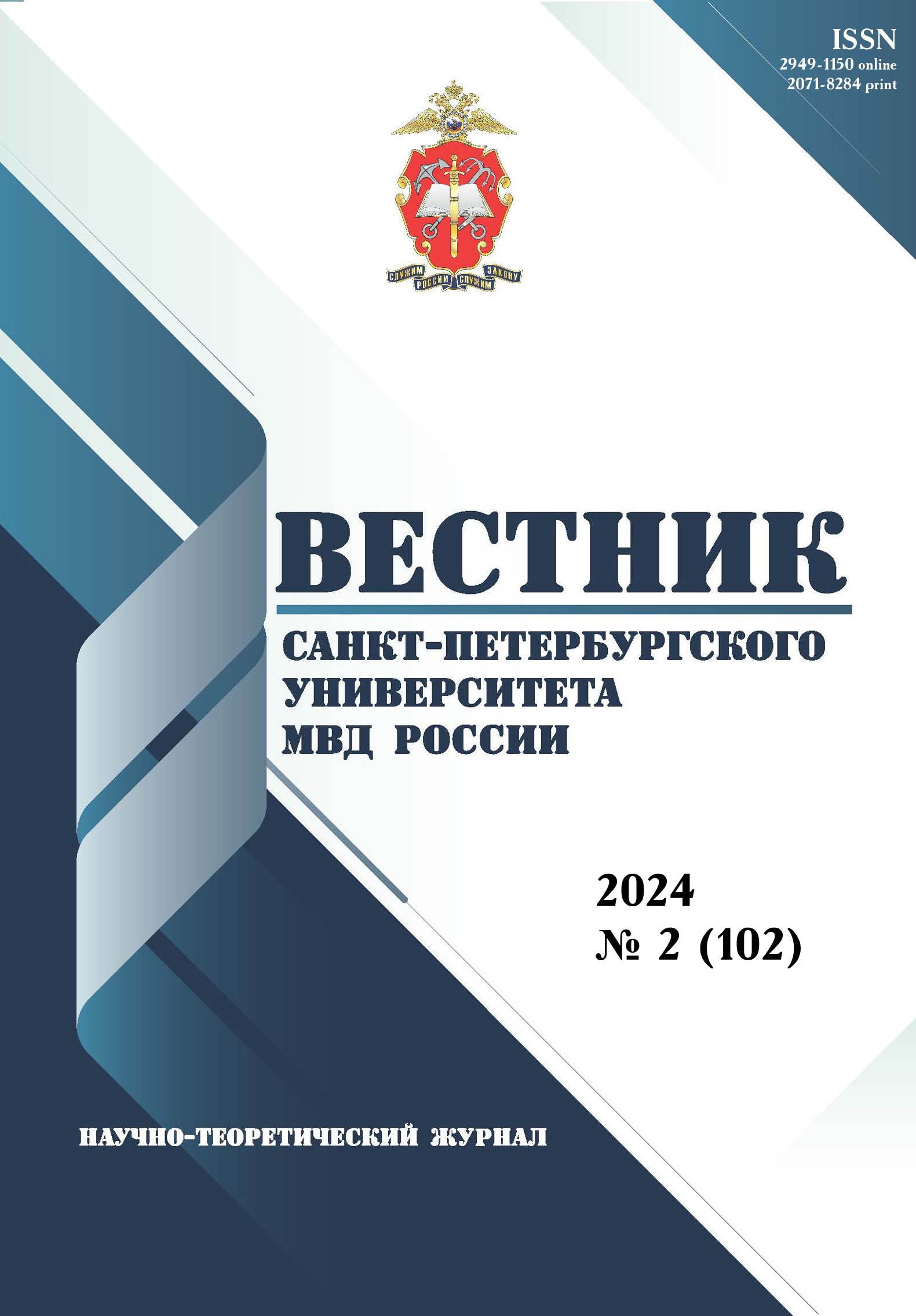Golicyno, Moscow, Russian Federation
UDC 159.99
Introduction. The article is devoted to the analysis of life goals, aspirations, materialism of employees of internal affairs bodies, the selection of psychodiagnostic tools in the framework of a global study of professional self-awareness of subjects of official activity. The relevance of the research topic is determined by the uncertainty of the structure of professional self-awareness of the individual, the lack of a developed program and methodology for empirical research of professional self-awareness, recommended methods for diagnosis, including life goals, aspirations, materialism. For the activities of the internal affairs bodies, it is necessary to solve personnel issues, select the most promising, reliable employees for service, accompany them throughout their service, and promote their professional development. In this regard, the role of the psychologist of the internal affairs bodies in conducting individual and group work with employees, carrying out psychodiagnostics and subsequent support is increasing. Methods. In carrying out this part of the scientific research, we used such methods as scientific categorical analysis, typologization, testing. Results. The questionnaire “Index of aspirations” (T. Kasser, R. District in the adaptation of T. O. Gordeeva, O. A. Sychev, V. A. Egorova) made it possible to assess the severity of both external and internal aspirations of a person, to give them a general assessment and on separate scales, respectively. This questionnaire is included in the program of the study of professional selfawareness of subjects of official activity, indicating the following as motivational components of the structure: relationships, community, appearance, fame, influence. Self-expression was attributed to the reflexive components. The results of the diagnosis of dispositional materialism as an integral part of the structure of professional self-awareness are obtained; positive relationships between individual indicators of the component composition of the structure of professional self-awareness are revealed.
professional self-awareness, life goals, internal aspirations, external aspirations, dispositional, materialism, psychological diagnostics
1. Pryazhnikova Ye. Yu., Chistovskiy D. I. Samosoznaniye studentov s OVZ na etape professional’nogo razvitiya // Psikhologicheskaya nauka i obrazovaniye. – 2014. – T. 19. – № 4. – S. 81–91.
2. Borozinets N. M. Definitsiya «professional’noye samosoznaniye» v trudakh otechestvennykh i zarubezhnykh uchonykh // Mir nauki, kul’tury, obrazovaniya. – 2014. – № 1 (44). – S. 16–18.
3. Dugarova T. Ts., Prokhorenko Ye. O. Professional’noye samosoznaniye studentov magistratury, obuchayushchikhsya po napravleniyam «Psikhologiya» i «Pedagogika» // Obshchestvo: sotsiologiya, psikhologiya, pedagogika. – 2020. – № 8 (76). – S. 53–60; https://doi.org/10.24158/spp.2020.8.9.
4. Abul’khanova K. A. Soznaniye lichnosti kak zhiznennaya sposobnost’ // Mir psikhologii. – 2018. – № 2 (94). – S. 30–36.
5. Fedorova Ye. P. Zhiznennyye tseli kak pokazateli protsessa zhiznennogo samoosushchestvleniya na etape professional’nogo stanovleniya // Vestnik Moskovskogo instituta gosudarstvennogo upravleniya i prava. – 2017. – № 1 (17). – S. 154–157.
6. Gayfullin A. Yu. Tsennostnyye oriyentatsii i zhiznennyye tseli sovremennoy molodezhi Respubliki Bashkortostan // Ufimskiy gumanitarnyy nauchnyy forum. – 2022. – № 1 (9). – S. 120–127; https://doi.org/10.47309/2713-2358_2022_120_127.
7. Sedova N. N. Zhiznennyye tseli i strategii rossiyan: kontekst passionarnosti // Sotsiologicheskiy zhurnal. – 2016. – T. 22 – № 2. – S. 73–91; https://doi.org/10.19181/socjour.2016.22.2.4260.
8. Gordeyeva T. O., Sychev O. A., Yegorov V. A. Diagnostika zhiznennykh tseley: Kratkaya versiya oprosnika «Indeks stremleniy» // Psikhologicheskiy zhurnal. – 2023. – T. 44. – № 4. – S. 49–62; https://doi.org/10.31857/S020595920027085-9.
9. Karpinskiy K. V., Kisel’nikova (Volkova) N. V. Oprosnik dispozitsionnogo materializma (ODM): kontseptual’nyye osnovy i psikhometricheskaya razrabotka // Psikhologicheskiy zhurnal. – 2019. – T. 40. – № 1. – S. 104–117; https://doi.org/10.31857/S020595920002256-7.
10. Abul’khanova K. A. Problemy soznaniya i yego issledovaniy v otechestvennoy psikhologii XX–XXI stoletiy / Fundamental’nyye i prikladnyye issledovaniya sovremennoy psikhologii : rezul’taty i perspektivy razvitiya : sbornik nauchnykh rabot / otv. red. A. L. Zhuravlov, V. A. Kol’tsova. – Moskva: Institut psikhologii RAN, 2017. – S. 158–166.
11. Pryazhnikova Ye. Yu., Yegorenko T. A. Problema professional’nogo stanovleniya lichnosti // Sovremennaya zarubezhnaya psikhologiya. – 2012. – T. 1. – № 2. – S. 111–122.
12. Gudimenko O. V. Samodeterminatsiya stremleniya k samoaktualizatsii i dostizheniyu uspekha v yunosheskom vozraste // International Journal of Medicine and Psychology. – 2023. – T. 6. – № 2. – S. 189–194.
13. Gadiliya A. M., Mesnikovich S. A. Zhiznennyye tseli v strukture professional’nogo stanovleniya studentov // Nauchnyye trudy Respublikanskogo instituta vysshey shkoly. Istoricheskiye i psikhologo-pedagogicheskiye nauki. – 2016. – № 16-2. – S. 59–65.
14. Skosyreva N. D., Zinich A. V., Pomogayev V. M., Razumov V. I., Revyakina Yu. N., Vasyukova M. V. Zhiznennyye perspektivy, tsennosti i tseli molodezhi Sibiri (po dannym issledovaniya v Sibirskom federal’nom okruge) // Idei i idealy. – 2022. – T. 14. – № 2-2. – S. 411–428; https://doi.org/10.17212/2075-0862-2022-14.2.2-411-428.
15. Slastenin V. A. Professional’noye samosoznaniye uchitelya // Sibirskiy pedagogicheskiy zhurnal. – 2005. – № 2. – S. 170–177.
16. Rozhkov D. V., Agapov V. S., Abdurakhmanov R. A. Osobennosti proyavleniya lichnostnykh strukturnykh komponentov samoupravleniya studentov v uchebnoy deyatel’nosti // Vestnik Tverskogo gosudarstvennogo universiteta. Seriya: Pedagogika i psikhologiya. – 2023. – № 2 (63). – S. 22–30; https://doi.org/10.26456/vtpsyped/2023.2.022.














